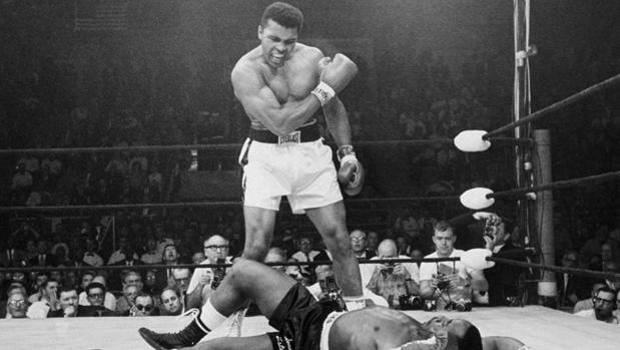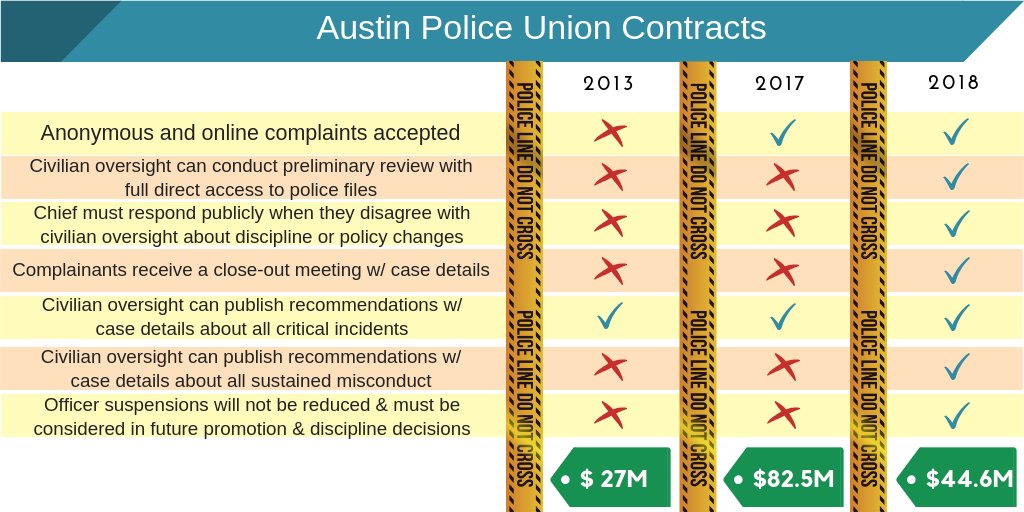 |
| Austin Justice Coalition's victory over police union brings to mind history's greatest upsets |
Although the local media has reported that the Austin police contract was finally approved and activists were happy with the result, only one local TV station report that I saw attempted to parse changes in the contract from a police accountability standpoint.
Advocates' year-long battle resulted in savings of $10 million per year compared to the contract rejected last December, as well as achieving greater transparency about police misconduct, the ability of the Police Monitor to accept anonymous complaints, and an end to the practice downgrading violations after a period of time so that they disappeared from public view (and couldn't be considered by the Chief in the event of future misconduct.)
Activists didn't get all they wanted. Of the six items in Campaign Zero's wish list for accountable police contracts, for example, the Austin Justice Coalition (AJC) and its allies only won one of them. That said, there were other accountability items specific to the Austin contract (e.g., downgrading violations over time) that weren't on Campaign Zero's list, and they were important, too.
 |
| Campaign Zero co-founder Sam Sinyangwe with Austin Justice Coalition co-founder Chas Moore |
Before the contract defeat, AJC could get no traction for reforming oversight. In the months before last December's marathon hearing, at which the proposed union contract was finally voted down, AJC and allies presented eight reforms to both the City and the police association. The association never sat down with reformers, and the city failed to introduce the ideas into the negotiation process.
 |
| Campaign Zero's Deray McKesson with the Austin Justice Coalition policy team in Grits' living room. |
As it happens, my wife was heavily involved in AJC's efforts to influence the contract and create a new oversight system for Austin. In the most recent episode of Just Liberty's Reasonably Suspicious podcast, she outlined the changes made and what comes next. Since the details of the new oversight system have received so little attention, I decided to pull out those comments as a stand-alone segment for anyone interested. Give them a listen:
Next month, both Chas Moore and Ron DeLord, the lead negotiator for the police union, have agreed to a joint interview/conversation on the podcast to describe the process and lessons learned from it, so I'm looking forward to that.
MORE: Chris Harris of Grassroots Leadership posted on Twitter this helpful graphic showing the impact of grassroots advocacy on the police-union contract and civilian oversight in Austin. The left-hand column was the old contract; the middle column is the one rejected by the City Council after a populist uprising last December; and the right-hand column is the new, final contract. Quite an improvement, huh? Especially on the price tag!
For more background, see these prior, related Grits posts:
MORE: Chris Harris of Grassroots Leadership posted on Twitter this helpful graphic showing the impact of grassroots advocacy on the police-union contract and civilian oversight in Austin. The left-hand column was the old contract; the middle column is the one rejected by the City Council after a populist uprising last December; and the right-hand column is the new, final contract. Quite an improvement, huh? Especially on the price tag!
For more background, see these prior, related Grits posts:
- Austin's police contract among worst in nation from accountability standpoint, says Campaign Zero co-founder
- Checking in on opposition to the Austin police contract
- Overtime for police court appearances a growing cost driver at Austin PD
- Critiquing Austin's police union contract
- Podcast: Police unions, collective bargaining and accountability (three segments)
- Interview: Campaign Zero's Sam Sinyangwe
- A primer for police union leaders on 'making the guilty innocent' after high-profile incidents
- Snippets of opposition to Austin's police contract
- Uncharted territory: Rejected police union contract leaves open many questions
- Journalists failing to call out official lies in Austin police contract debate
- More one-sided coverage of Austin PD retirements
- Interview: Ron DeLord on the Ferguson Effect, police pensions, and why he considers Saul Alinsky a major influence
- Austin police oversight ineffective, says audit; local media silent on narrative-busting analysis
- Austin police union overplaying its hand by rejecting accountability measures

Law Enforcement oversight should be coupled with Law Enforcement understanding. Most who are not Law Enforcement officers themselves, but work with them enough to understand the great good, but sometimes bad, actions they take do not occur in a vacuum. Preconceived ideas and generalized biases have no place in an oversight effort. Those doing the oversight should be prepared to learn at least as much as they teach, to be judged at least as much as they judge, and to listen as much as they talk. Done right this Austin contract could be an example for other large cities. Done wrong and it will be a disaster.
ReplyDeleteOn the bright side, oversight can't be any more ineffective or useless than it was before. And now there's (slightly) more transparency, though not as much as, say, at the Travis County Sheriff or hundreds of non-civil service TX PDs.
ReplyDeleteNot sure where you see the potential for "disaster." The chief still makes all the final discipline calls. These were relatively modest changes.
I just meant a disaster if all these efforts at tranparancey failed for one reason or another. Grits should know that 'things happen' and no one is really immune from that. If this doesn't work then it would be a step back and activists would be starting all over again to regain that lost ground. Maybe they are limited - but - they are a start. That is the amazing part. Grits should cook dinner around the house for one full week as a reward for your advocate.
ReplyDeleteYou are absolutely correct about the change. Anything would be good. Whoever thought that putting Margo Frasier in that role would accomplish anything except helping Margo Frasier meet her personal goals was crazy. All she wanted was Art Acevedo's job and she might have gotten it too had she not shown her true self-centered colors. I almost threw up on the AAS newspaper when I saw that image of her using that poor dead officer's young daughter to gain positive publicity for herself after her narcotics task force (later disbanded) bungled the raid that got the officer, the girl's father, killed in the first place. She used her city computer for shopping and her two other jobs during work hours and skated on that. Maybe Grits can help me remember the incident surrounding a leak coming from a committee that Frasier was part of and how she vowed to find the 'leaker' but never did. Of course every time she was interviewed about her efforts in locating the leak she would say "It wasn't me. I can tell you that." The way she said it sounded more like a subconscious confession which I expect it was.
FWIW, I've cooked 95% of dinners in our marriage for more than a quarter century. Thanks for the kudos, though, I'll pass them along.
ReplyDeleteMargo may have been ambitious, but she objectively was better at the OPM job than any other we've had before Farah, IMO. Her efforts just showed the old office was a toothless waste of time. Someone finally was performing all the office's functions (most PMs just drew a paycheck and did nothing), and what it demonstrated was that what little the office could do was worthless.